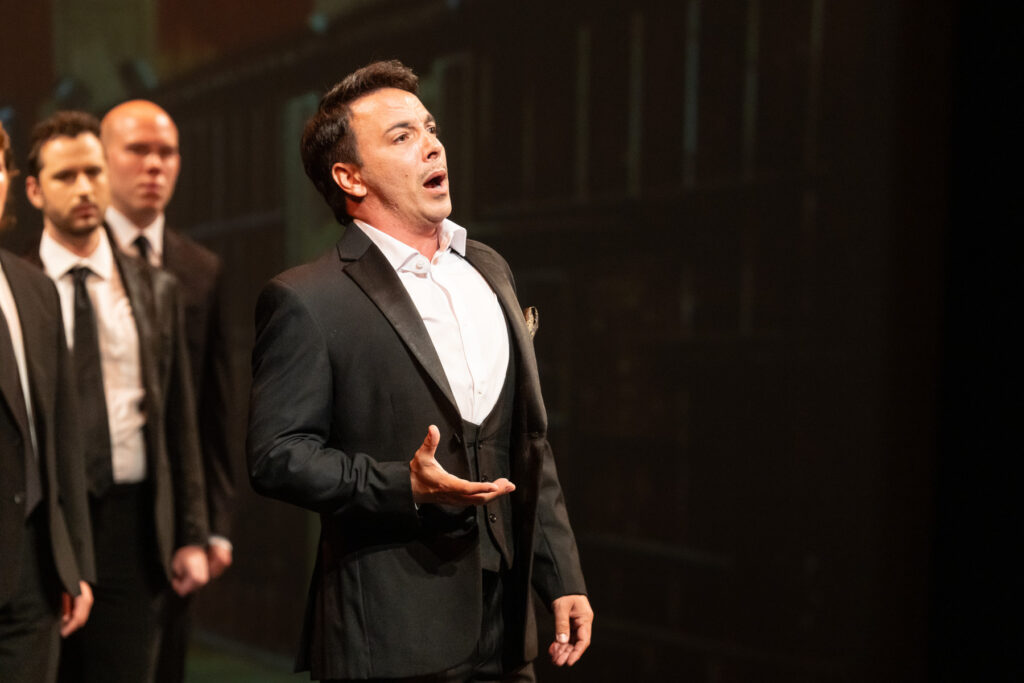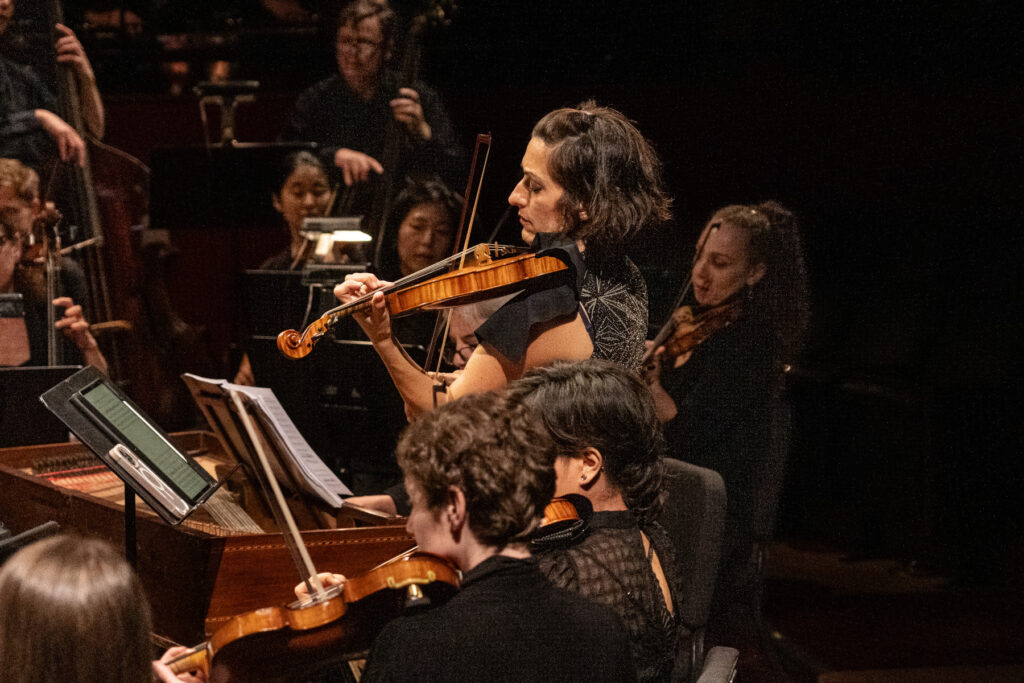With New York’s Metropolitan Opera struggling to hype star singers, commission enduring new works, fill a mammoth space, and balance its budget, the vitality of the city’s opera scene has passed to smaller companies.
Among the most exciting is Teatro Nuovo. The company’s director, Will Crutchfield, is an indefatigable conductor and musicologist specializing in the Italian bel canto. With Teatro Nuovo, he continues pioneering work done for two decades at the Caramoor Festival.
In last Wednesday’s performance at the Rose Theater, Teatro Nuovo presented Anna di Resburgo, an opera written by Carolina Uccelli, a female composer forgotten for two centuries.
In the early 1830s, Uccelli attempted the impossible: to enter the all-male world of Italian opera composition. The daughter of minor Florentine aristocracy of no musical distinction, she received piano training and began composing early. Despite her early success, which attracted enthusiastic backing from Rossini and other notable composers, she was unable to sustain a career in the face of a scornful and misogynistic press and public.

Today, all that remains are several dozen songs for piano and voice (engagingly performed at a pre-concert event), one secular cantata, and Anna di Resburgo. Crutchfield recently located the original manuscript in Neapolitan archives and prepared it for performance, allowing us to enjoy a work that no one has heard since 1835.
Anna is an extraordinary, full-scale bel canto melodrama. It holds the audience’s attention for three hours with music that is technically confident, often distinctive, and occasionally brilliant. Its climax—a graveyard ghost scene with an aria for baritone and chorus, accompanied by an overpowering funeral march—reveals the unmistakable traces of genius.
Even more extraordinarily, Anna was the second of two operas by Uccelli, both written before her 25th birthday. Among her contemporaries, only Rossini was more precocious. One can only second Crutchfield’s conclusion in a pre-concert lecture that, while Anna is not yet a masterpiece, it suggests that Uccelli’s fourth or fifth opera would have been—had the near universal prejudices of her times not blocked her rise.
With a large pool of young singers based in the City or anxious to sing there, resurrecting a forgotten bel canto opera still requires that one find those who possess the extraordinary technique and commitment to internalize a new role that they might well never perform again, with no help from recordings. Bel canto is, moreover, a world of stylized improvisation that demands singers who transcend technical limitations to realize personal interpretive inspiration.

Here Teatro Nuovo truly excels. Throughout, one sensed that every singer in this performance had been unusually well-coached: their Italian diction was crystal clear, phrasing and coloring stylish and coherent, and each exploited opportunities to spin long phrases on a single breath. This reflected, one assumes, hard work behind the scenes by Crutchfield and the language coach (and former soprano) Lucy Tucker Yates, who also played the harpsichord. The result was a rare opera performance where every aspect seemed compellingly crafted.
Leading the cast were three young singers of uncommon passion, skill, and interpretive nuance.
Born in Puerto Rico, baritone Ricardo José Rivera is rising through major US opera houses. He brought a grand, dark-colored baritone voice to the villain Norcesto. Whereas at first he seemed to overuse his natural gift, the sudden vocal restraint and emotional depth of his final repentance scena stole the show. He could be a singer to watch.
Tenor Santiago Ballerini possesses the bright penetrating timbre and spot-on intonation of the best bel canto tenors. More striking is his suave elegance, including the imaginative use of head voice, often in a breathtaking pianissimo. Until just a few years ago, Ballerini performed exclusively in his native Argentina but is now embarked on a rapidly expanding international career. He is another singer I would like to hear again.
Tennessee-born Chelsea Lehnea’s technically solid soprano is less even or sweet than edgy—with a visceral emotionality that can be overwhelming. She was entirely believable as a passionate mother going toe-to-toe with a duplicitous villain.
In addition, tenor Lucas Levy’s sang father Olfredo, gamely presenting some difficult passages, not least Uccelli’s (unique) non-comic patter aria for tenor. Soprano Elisse Albian assumed the role of Etelia, his daughter, with precision and delicacy. Andrew Allan Hiers deployed a deep bass in the role of Donaldo di Solis, Norcesto’s confidant. The chorus sang lustily and cleanly.
Just as impressive was the orchestral direction of Elisa Citterio, a world-renowned Italian violinist who conducted the performance through balletic body movement, while all the while playing the devilishly difficult primo violino part. In an era when bel canto opera conducting has become slow and soggy, her brisk tempos, rhythmic verve, and constant infusion of energy were revelatory. While occasionally scrappy—in the way early musicians can be—the orchestra responded well. The semi-staging was handled by Stage Director Marco Nisticó, a former opera singer himself, in unobtrusive ways that enhanced the intimacy of the plot.
The second act of this unlikely revival of an unknown work contained the most enjoyable live opera I have heard in New York this year. It left little doubt that this opera should be heard more widely and recorded well. In sold-out Rose Hall, the performance was greeted by the best type of opera audience, pin-drop silent when it mattered and enthusiastic at the close.
Andrew Moravcsik
Anna di Resburgo
Composed by Carolina Uccelli (1810~1858)
Libretto: Gaetano Rossi, revised by the composer
Anna di Resburgo – Chelsea Lehnea; Edemondo – Santiago Ballerini; Norcesto di Cuminoo = Ricardo José Rivera; Olfredo – Lucas Levy; Etelia – Elisse Albian; Donaldo di Solis – Andrew Allan Hiers; A Herald – Markos Simopoulos.
Teatro Nuovo Chorus and Orchestra; Elisa Citterio, primo violino e capo d’orchestra; Lucy Tucker Yates, maestro al cembalo; Marco Nisticó – Stage Director.
Teatro Nuovo, Rose Theater at Jazz in Lincoln Center, New York City (24 July).
Top image: Chelsea Lehnea as Anna and Ricardo Joseì Rivera as Norcesto.
All photos courtesy of Teatro Nuovo, New York.